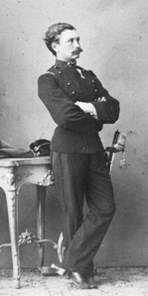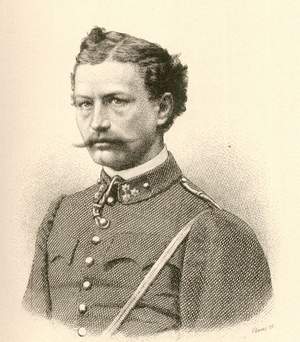Moritz Ritter von Lehmann
 Moritz Ritter von Lehmann was born at Zloczów
(Galicia) on
the 15th of June 1836. As the son of a senior officer is was no
question that he and his younger brother Otto decided upon an officers' career. After finishing the Theresian Military
Academy at Wiener Neustadt he was commissioned as an Unterleutnant in the
1st ulan regiment on the 15th of June 1854 shortly followed by his promotion to Leutnant on the 1st February 1855 and
to Oberleutnant on the 1st of December of the same year. During the campaign of 1859 in Italy he was promoted to Rittmeister 2nd class
(28th May 1859) and received his baptism of fire in the battles
of Magenta and Solferino. For his outstanding achievement near
Orfengo - he protected the retreat of the half brigade Wiedmann -
he was honoured with the award of the military merit cross with war
decoration on the 17th of December 1859. On the 1st of March 1860
he was transferred to the 4th division of the 1. Freiwilligen
Ulanen Regiment but when it was disbanded on the1st of September
1862 he returned to ulan regiment number 1 in which his
younger brother Otto was now also on duty as an Oberleutnant. On the
1st of June 1864 he took over command of the 5th squadron.
Moritz Ritter von Lehmann was born at Zloczów
(Galicia) on
the 15th of June 1836. As the son of a senior officer is was no
question that he and his younger brother Otto decided upon an officers' career. After finishing the Theresian Military
Academy at Wiener Neustadt he was commissioned as an Unterleutnant in the
1st ulan regiment on the 15th of June 1854 shortly followed by his promotion to Leutnant on the 1st February 1855 and
to Oberleutnant on the 1st of December of the same year. During the campaign of 1859 in Italy he was promoted to Rittmeister 2nd class
(28th May 1859) and received his baptism of fire in the battles
of Magenta and Solferino. For his outstanding achievement near
Orfengo - he protected the retreat of the half brigade Wiedmann -
he was honoured with the award of the military merit cross with war
decoration on the 17th of December 1859. On the 1st of March 1860
he was transferred to the 4th division of the 1. Freiwilligen
Ulanen Regiment but when it was disbanded on the1st of September
1862 he returned to ulan regiment number 1 in which his
younger brother Otto was now also on duty as an Oberleutnant. On the
1st of June 1864 he took over command of the 5th squadron.
During the campaign of 1866 Rittmeister Moritz Ritter von
Lehmann was with the northern army. On the 27th of June 1866 his squadron formed
the extreme left wing of the troops of Oberst Ziegler
who were to protect the city of Craców. At 6 o'clock in the
morning he received the message that a much superior Prussian formation was
nearing and a Prussian ulan regiment was riding towards
the Sola bridge. Rittmeister Moritz Ritter von Lehmann, who was
at this moment in the railway station of Oswiecim, realised that
this would not only be dangerous for the city but he also noticed rightly that the
Prussian ulan regiment would cut off a large
number of Austrian troop from their lines of withdrawal. The only possibility
to avoid this possibility was to delay the Prussian ulans for as long as possible. He took his
squadron and 2
Züge (troops) of Rittmeister Baron Bertoletti's 4th squadron who were fortuitously
in his area and decided to attack the 4 squadrons strong Prussian 2nd Landwehr ulan regiment
immediately. He spoke some heroic words about Kaiser and
fatherland to his men and than commenced the attack riding far in front of
his men. The Prussian ulans were surprised and
could not suspect that such a small group would attack their whole
regiment and did immediately react. Rittmeister Ritter von
Lehmann found the commander of the Prussian regiment, Major von Busse, riding
straight towards him, stopped, saluted and
introduced himself by telling his name and rank and with one hard
hit of his sabre felled him immediately with a wound to his shoulder. When the surrounding
Prussians saw their commander falling they overcame their
shock and the heroic Rittmeister Moritz Ritter von Lehmann was pierced by half a
dozen lances. At this moment the Austrian ulans struck the enemy and fighting like lions they were able to
delay the Prussian regiment for the necessary time
 In the evening of the same day a
Prussian parliamentary reported himself to the Austrian command bringing a letter
from the German commander which expressed his congratulations for this
outstanding bravery which contained the merit cross and a medallion (containing the picture of
Lehmann's young wife ( he had married only some months previously) which was found by his
dead body on the
battlefield. EscortPage When the heroic death of the commander of the 5th squadron was
brought to the Kaiser's attention, Ritter von Lehmann was
immediately honored by the posthumous award of the order of the Iron Crown 3rd
class with war decoration on the 5th July 1866. At the proposal of all the officers of the 1st ulan regiment he was
further honored by the award of the knight's cross of the Militär Maria
Theresien Orden on the 29th of August 1866 again directly by the
Kaiser. On the 23rd of April 1868 it was decided that his widow
Olinde, his daughter Marizia and his brother Otto, who was still an officer in the regiment, should
also receive the late captain's posthumous ennobling to
"Freiherr von" and an Obelisk was built at the
battlefield honoring him and all his men who were
killed during this fight on the 27th of June 1866.
In the evening of the same day a
Prussian parliamentary reported himself to the Austrian command bringing a letter
from the German commander which expressed his congratulations for this
outstanding bravery which contained the merit cross and a medallion (containing the picture of
Lehmann's young wife ( he had married only some months previously) which was found by his
dead body on the
battlefield. EscortPage When the heroic death of the commander of the 5th squadron was
brought to the Kaiser's attention, Ritter von Lehmann was
immediately honored by the posthumous award of the order of the Iron Crown 3rd
class with war decoration on the 5th July 1866. At the proposal of all the officers of the 1st ulan regiment he was
further honored by the award of the knight's cross of the Militär Maria
Theresien Orden on the 29th of August 1866 again directly by the
Kaiser. On the 23rd of April 1868 it was decided that his widow
Olinde, his daughter Marizia and his brother Otto, who was still an officer in the regiment, should
also receive the late captain's posthumous ennobling to
"Freiherr von" and an Obelisk was built at the
battlefield honoring him and all his men who were
killed during this fight on the 27th of June 1866.
The two official histories of the campaign have slightly conflicting figures
for casualties suffered at Oswiecim. The Austrian history gives:
|
Officers |
NCOs and men |
| Killed |
4 |
20 |
| Missing |
- |
4 |
| Wounded |
1 |
35 |
| Prisoner |
2 |
12 |
The Prussians are reported to have lost 7 officers and 166 NCOs and Privates.
The Prussian history claims the loss of 6 officers and 166 NCOs and men. The
Austrian prisoner total is also disputed with a reported capture of 1 officer
and 27 NCOs and troopers in the cavalry engagement alone.
Back to Miscellaneous Biographies

 Moritz Ritter von Lehmann was born at Zloczów
(Galicia) on
the 15th of June 1836. As the son of a senior officer is was no
question that he and his younger brother Otto decided upon an officers' career. After finishing the Theresian Military
Academy at Wiener Neustadt he was commissioned as an Unterleutnant in the
1st ulan regiment on the 15th of June 1854 shortly followed by his promotion to Leutnant on the 1st February 1855 and
to Oberleutnant on the 1st of December of the same year. During the campaign of 1859 in Italy he was promoted to Rittmeister 2nd class
(28th May 1859) and received his baptism of fire in the battles
of Magenta and Solferino. For his outstanding achievement near
Orfengo - he protected the retreat of the half brigade Wiedmann -
he was honoured with the award of the military merit cross with war
decoration on the 17th of December 1859. On the 1st of March 1860
he was transferred to the 4th division of the 1. Freiwilligen
Ulanen Regiment but when it was disbanded on the1st of September
1862 he returned to ulan regiment number 1 in which his
younger brother Otto was now also on duty as an Oberleutnant. On the
1st of June 1864 he took over command of the 5th squadron.
Moritz Ritter von Lehmann was born at Zloczów
(Galicia) on
the 15th of June 1836. As the son of a senior officer is was no
question that he and his younger brother Otto decided upon an officers' career. After finishing the Theresian Military
Academy at Wiener Neustadt he was commissioned as an Unterleutnant in the
1st ulan regiment on the 15th of June 1854 shortly followed by his promotion to Leutnant on the 1st February 1855 and
to Oberleutnant on the 1st of December of the same year. During the campaign of 1859 in Italy he was promoted to Rittmeister 2nd class
(28th May 1859) and received his baptism of fire in the battles
of Magenta and Solferino. For his outstanding achievement near
Orfengo - he protected the retreat of the half brigade Wiedmann -
he was honoured with the award of the military merit cross with war
decoration on the 17th of December 1859. On the 1st of March 1860
he was transferred to the 4th division of the 1. Freiwilligen
Ulanen Regiment but when it was disbanded on the1st of September
1862 he returned to ulan regiment number 1 in which his
younger brother Otto was now also on duty as an Oberleutnant. On the
1st of June 1864 he took over command of the 5th squadron.